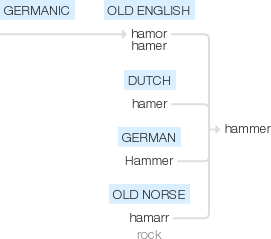Hammer
Old English hamor, hamer, of Germanic origin: related to Dutch hamer, German Hammer, and Old Norse hamarr ‘rock’. The original sense was probably ‘stone tool’.
wiktionary
From Middle English hamer, from Old English hamor, from Proto-West Germanic *hamar, from Proto-Germanic *hamaraz(“tool with a stone head”) (compare West Frisian hammer, Low German Hamer, Dutch hamer, German Hammer, Danish hammer, Swedish hammare), from Proto-Indo-European *h₂eḱmoros (compare Sanskrit अश्मर(aśmará, “stony”)), itself a derivation from *h₂éḱmō(“stone”).
For *h₂éḱmō(“stone”), compare Lithuanian akmuõ, Latvian akmens, Russian камень(kamenʹ), Serbo-Croatian kamēn, Albanian kmesë(“sickle”), Ancient Greek ἄκμων(ákmōn, “meteor rock, anvil”), Avestan 𐬥𐬀𐬨𐬯𐬀 (namsa), Sanskrit अश्मन्(áśman)) (root *h₂eḱ-(“sharp”)).
(declare a defaulter on the stock exchange): Originally signalled by knocking with a wooden mallet.
etymonline
hammer (n.)
Old English hamor "hammer," from Proto-Germanic *hamaraz (source also of Old Saxon hamur, Middle Dutch, Dutch hamer, Old High German hamar, German Hammer). The Old Norse cognate hamarr meant "stone, crag" (it's common in English place names), and suggests an original sense of the Germanic words as "tool with a stone head," which would describe the first hammers. The Germanic words thus could be from a PIE *ka-mer-, with reversal of initial sounds, from PIE *akmen "stone, sharp stone used as a tool" (source also of Old Church Slavonic kamy, Russian kameni "stone"), from root *ak- "be sharp, rise (out) to a point, pierce."
As a part of a firearm, 1580s; as a part of a piano, 1774; as a small bone of the ear, 1610s. Figurative use of "aggressive and destructive foe" is late 14c., from similar use of French martel, Latin malleus. To go at it hammer and tongs "with great violence and vigor" (1708) is an image from blacksmithing (the tongs hold the metal and the hammer beats it). Hammer and sickle as an emblem of Soviet communism attested from 1921, symbolizing industrial and agricultural labor.
hammer (v.)
late 14c., "deal blows with a hammer or axe;" mid-15c., "to produce (something) by blows with a hammer," from hammer (n.). Also sometimes in Middle English the verb to describe how Christ was crucified. Figurative meaning "work (something) out laboriously" recorded from 1580s. Meaning "beat or drive with or as if with a hammer" is from 1640s; that of "to defeat heavily" is from 1948. Old English had hamorian "to beat out, forge." Related: Hammered; hammering.
Crist, as he was ruthfully hamerd apon the croce, Songe to his fadire of heven.
["The Mirror of Man's Salvation," 15c.]
